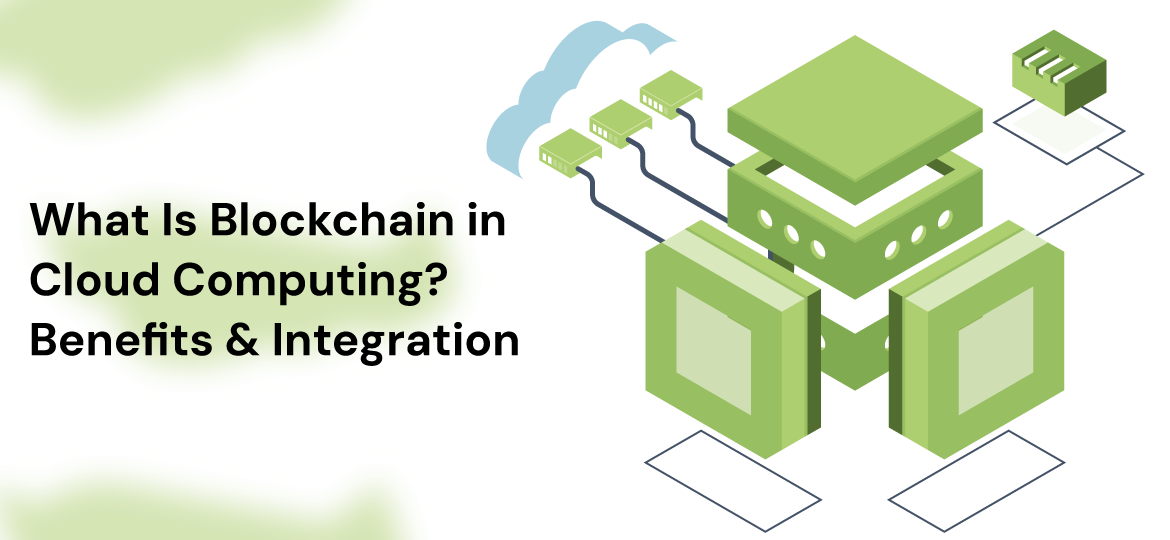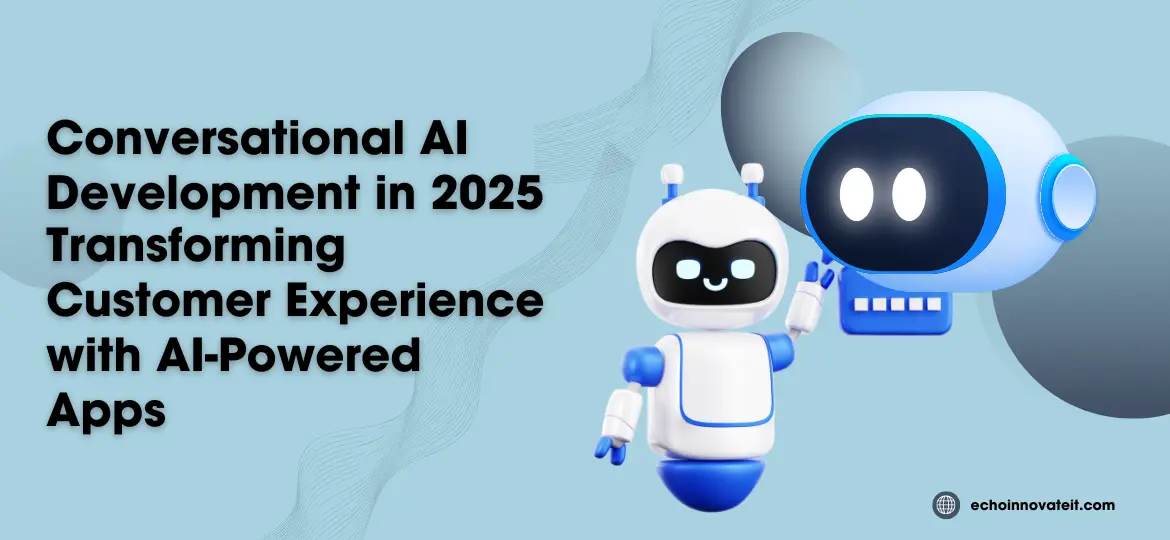Blockchain consists of various features which give significance to it like decentralization, transparency, and security. These features have made Blockchain a revolutionary and promising technology of several industrial uses for the modern generations today. With the interlinking of cloud computing and the Internet of Things, the Cloud of Things field came into existence. Here blockchain serves as a solution that can face the challenges that arise in the Cloud of Things with the help of decentralization, data privacy, and security of the network. Elasticity and scalability functionalities of Cloud of Things enhance blockchain operations for enhancing the overall efficiency of blockchain operations.
What Is Blockchain?
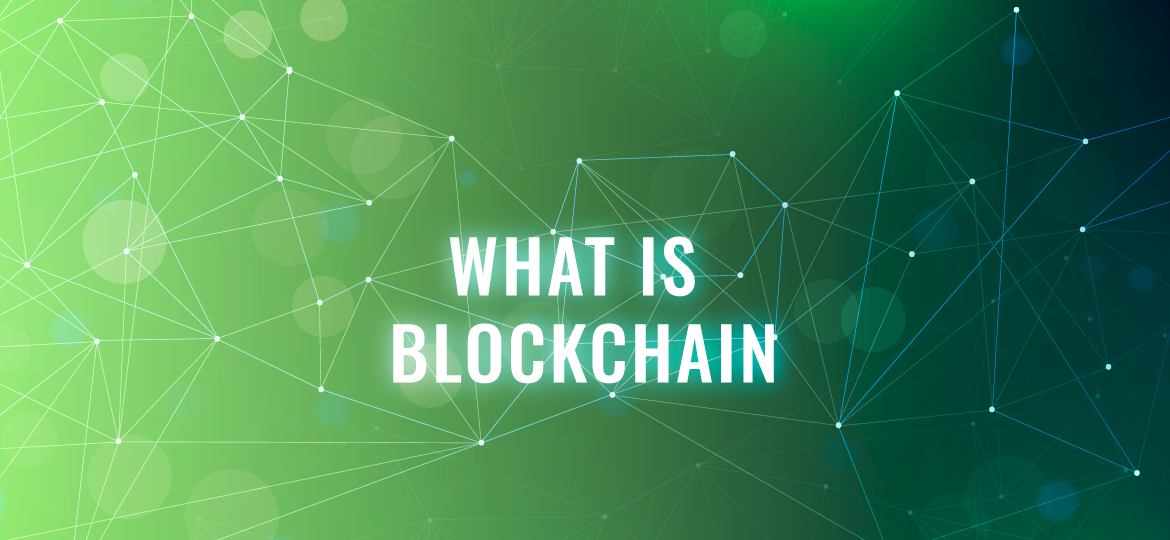
Blockchain App Development is a booming technology in the modern market used by worldwide enterprises for storage, security, software development, and online transactions. Blockchain technology allows records of the ledger databases immutable, unlike cloud computing. With Blockchain App Development, businesses can leverage the benefits of decentralized networks to create secure, transparent, and tamper-proof applications that are not controlled by a central authority. These applications can be used in a wide range of industries, including finance, healthcare, supply chain management, and more.
The technology provides a linked list-like structural ledger database for storing transactional records known as blocks and integrates them with the link known as a chain.
Blocks, nodes, and miners are three essential concepts of blockchain. The system generates nonce (a 32-bit whole number) after the block generates. All the data in the blockchain resides within the block.
Records signing takes place cryptographically with the use of distributed consensus or protocol to validate these immutable. This feature of blockchain calls for the demand for robust transaction implementation in multi-structural business environments.
A blockchain contains a link to the previous block and has the information about it so it refrains from modification of any data in any of the blocks after the data is recorded once as it also changes the data in other blocks.
What Is Cloud Computing In Simple Terms With Example?
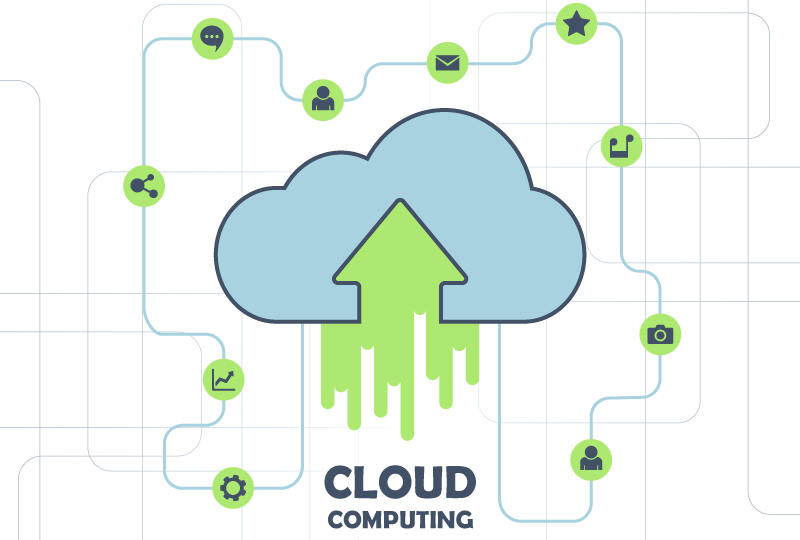
Cloud computing technology renders a model for efficient access to components and services for top application development and integration.
Cloud is a computing service that provides services in three principal formats Infrastructure as a Service (IaaS), Software as a Service (SaaS), and Platform as a Service (PaaS). It is the delivery of computing services to provide flexibility and innovation growth that includes software, storage, servers, database, networking, analytics, and intelligence over the cloud computing platforms.
Hence, worldwide enterprises and organizations are switching from traditional computing architecture to cloud-based architecture for management, maintenance, and security.
Benefits Of Blockchain Technology In Cloud Computing
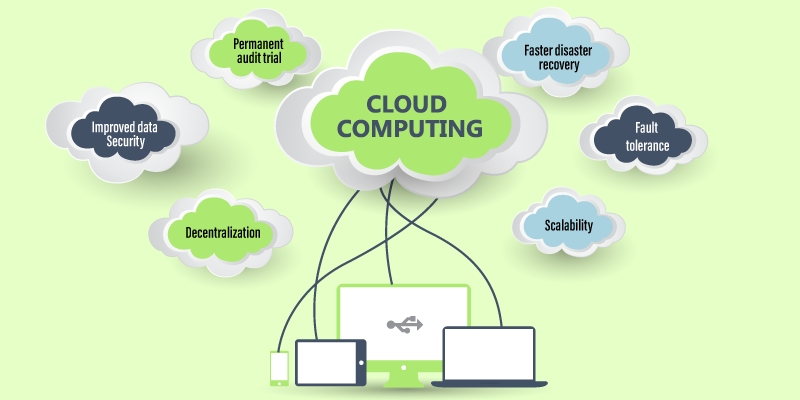
Decentralization
Dependency on a centralized server for managing data and taking decisions can risk the whole system if it fails and major important data loss stored in the central server can be incurred. Also, a hacker attack is a threat to the central server. The blockchain in CoT can provide a solution by enabling a decentralized system where multiple replicas of the same data are stored on different computer nodes. The problem can’t arise as there are already multiple copies of the data present on multiple nodes.
Permanent Audit Trial
One of the main benefits of blockchain is its lasting audit trails in cloud computing. Blockchain maintains a permanent Proof of History (PoH) for all past transactions and alterations which supports a verifiable delay function. It doesn’t only allow PoH but also helps in organizing in the correct order and maintaining a timeframe of the transaction information.
Fast Disaster Recovery
When using blockchain technology, the record of the transactions is spread widely. Any failure in one blockchain node does not affect the remaining blockchain copies as it is made public to many authorized users. Even though any single node crashes, other nodes keep operating in the system and upgrading the blockchain. Based on the record of the transactions and alterations history of the blockchain trials, any failed node of the network can reach the current status of the blockchain database as soon as it comes back online.
Fault Tolerance
With the help of collaborative Clouds, blockchain data can be replicated across a robustly interconnected network of computing servers. Because of the disruption of any cloud node, the single-failure risk is minimized and uninterrupted services are enabled.
Scalability
For enabling scalable blockchain services it is very crucial to have strong data processing services for high transaction execution as the number of blockchain transactions can be huge on large-scale blockchain applications. Due to scalability capabilities in this field, blockchain operations can be supplied with on-demand computing resources by the cloud. Thereon, the integration of cloud computing and blockchain can anticipate a highly scalable integrated system.
Scope Of Blockchain In Cloud Computing
We will see how the applications of blockchain can provide vast scope in cloud computing and expand its scope.
- When blockchain integrated with cloud computing, it resolved its biggest concern of data loss/ leaking by encrypting data for security and giving protection and privacy to the database.
- Visibility or transparency of the data is also a major threat to cloud security. Blockchain constructs a decentralized and distributed reliable model to help overcome this threat. Every action to be visible and eliminates the hampering of data is possible because of a public blockchain. Data is unchangeable by anyone after storing it once.
- Cloud computing involves third-party providers which can lead to a huge loss of data for enterprises if it crashes. Blockchains are governed by codes, so the coupled solution can prevent data loss.
- A Blockchain network guarantees authenticity and no data loss as Erasing data from one’s computer on a blockchain network does not affect the data stored on any other devices.
- The data stored on a blockchain is permanently there and allows easy traceability of data. This records all transactions and alterations made and then acts as an authentication benefit or audit.
Also Check:
Integration Of Blockchain And Cloud Computing
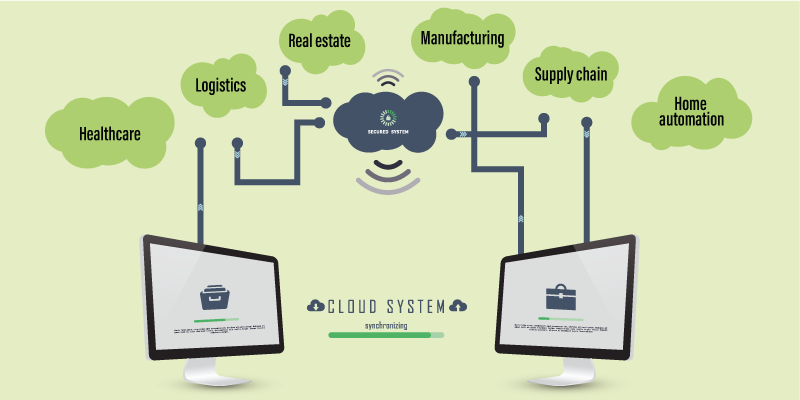
We will see how the applications of blockchain can provide vast scope in cloud computing and expand its scope.
Betterment of the Healthcare Sector
Blockchain in CoT proves to have great potential for applications in the Healthcare sector in modernizing and developing the current state of procedures and infrastructure. The Healthcare sector embraces various medical institutions and organizations in it. The major role of this sector is to deal with healthcare-related services, medical equipment, and instruments.
How does Blockchain in CoT come in?
- BCoT can anticipate solutions to critical issues concerning data security and the efficiency of the services.
- With the integration of blockchain and cloud computing with healthcare, CoT enabled sharing of data as well as creating efficient environments to share in the minimum time from the patient’s device to the doctors.
- One great example is that doctors can access medical information along with their health record through EHRs which processes and stores the data online on cloud storage using their mobile devices for monitoring health and giving optimum cure for patient’s disease.
- Blockchain solves security problems initiated to share health data in healthcare app development with the use of decentralized data verification of all peer nodes.
Agile Logistics
- As time passes the logistics sector creates a whole lot of possibilities for improvement. In recent times there has been a significant impact on people’s lives like time to travel, safety on roads, and lesser time requirement all with the help of fast-improving sensors, computing technologies, and communication systems.
- Smart logistics management can be considered as an IOT application that is linked to integrating architectures of vehicular services and communication technologies in transportation systems.
- As security risks emerged from dynamic vehicle-to-vehicle communication in vehicular environments and over-dependence on centralized network authorities it has to face some issues. That being the case, to help build a secured, reliable, and decentralized ITS ecosystem blockchain is useful.
Smart Home Automation
- Blockchain in Cloud computing is useful in one of the most relevant ways in smart home automation. Automating the devices of the home, gives comfort, luxury, and ease to the member.
- Automation blockchain in the smart home enhances security by removing the risk of data loss and data tampering. blockchain can be used to make a decentralized data integrity architecture for the stability of the whole system without needing any third party.
- A smart home can be thought of as a network of IoT devices consisting of sensors and detectors, that initially collect information from its surrounding environment, store it in the cloud, and then process the information to perform a specific task based on processed information.
- For example, a fire detection system will automatically start a water sprinkler if installed or run the fire alarm in case of a temperature sensing sensor that detects a fire in the home.
Smart Manufacturing
- Blockchain in manufacturing is a developing field of contribution to the world as it will work to deploy automated machines that can perform specific tasks in a much more intelligent way than in present times.
- Cloud manufacturing, IoT-enabled technologies, and service-oriented manufacturing are everything smart manufacturing is based on.
- But there are some issues like centralized industrial networks and third-part-based authority which smart manufacturing has to face at the current time.
- There is lower security, flexibility, and efficiency due to centralized manufacturing architectures.
- The deployment of BCoT, having the ability to enhance security and implement the decentralized architecture is the suitable solution for the problems arising.
Real Estate
- Blockchain in cloud computing has reached the real estate market with all the digital transformation and technology innovations. This industry has welcomed cutting-edge tech solutions to survive and compete in the market.
- Applying blockchain-powered systems cut off the middlemen costs and save lead to distinguish savings.
- For real estate entities and assets, blockchain technology offers a higher level of transparency to maintain record-keeping systems.
- Blockchain eliminates the influences of third parties in real estate hence the time to fulfill the formalities can reduces significantly.
Supply Chain
- A blockchain-based supply chain model will build a shared distributed ledger to keep a record of the data. Sequentially related to shipment status, track status, and storage environment conditions.
- Blockchain in cloud computing facilitates undisputed financial transactions among the parties as the terms and conditions of the contracts are written in computer codes.
- It provides instant access to all the information related to the products as an accurate data record where all the communications among IoT devices are saved in the history.
- Blockchain eliminates the fuss of paperwork throughout the ecosystem and also saves labor costs and ensures data security which was not present in the traditional approach.
Also Check:
Blockchain Vs Cloud Computing
As we have discussed both the terminologies and their features in detail, let us jump on to see the significant differences between them:
- We can now say that an encrypted system that uses different styles of encryption and hash to store data in protected databases is blockchain while cyberspace where we can gain access to data through the internet is the cloud.
- Data residing in the cloud are mutable whereas data in the form of records are immutable in the blockchain.
- Cloud is a computing service that provides services in three principal formats: Infrastructure as a Service (IaaS), Software as a Service (SaaS), and Platform as a Service (PaaS). Whereas, Blockchain does not provide any service.
- Cloud doesn’t give the assurance of full integrity and inaccessible data. While Blockchain guarantees the forbiddance of the data tempering without relying on any third-party dependable centralized authority.
- Cloud computing can push the execution of projects based on blockchain technology. On the other hand, blockchain has a key principle of decentralization. It does not allow it to store any of its data information in one space.
- In cloud computing, access to data and its existence can be either public or private. While the transparency of data is the basic characteristic of blockchain technology.
- Cloud computing stores data residing in machines involving participants because of a traditional database structure. But blockchain is a tamper-free and reliable online database registry of various digital transactions. Where alteration of data is possible by participants after taking approval from each party involved in it.
- Examples of Companies providing cloud computing services like Google, Microsoft, Amazon Web Services (AWS), Alibaba Cloud, and IBM. A few examples of blockchain technology involve Ethereum, Bitcoin, and Hyperledger Fabric.
Future Of Blockchain In Cloud Computing
Cloud computing tops the list as per the reports on top emerging business risks. In today’s business world, Cloud has become such an integral part. Even with the risk and harmfulness businesses still rely on it. Cloud models exceedingly based on security, compliance, and centralization can give rise to major business risk. Enterprises rushed to cloud computing app development. Cloud computing services, and top mobile app solutions without checking in and risked their data security.
Blockchain is positively working in the direction of making business processes, and transactions and making storage safe, fast, and secure. Thus, integrating blockchain and CoT gives the privilege of decentralization and more security that gives authorization, efficiency, and privacy to work with. However, the challenges that blockchain in cloud computing faces are needed to be worked on in the future with the help of in-depth research.
For inquiries on how to navigate these challenges and optimize your business processes securely, feel free to contact us at Echoinnovate IT.
FAQs
Is blockchain a part of IoT?
No, Blockchain has been implemented with IoT in various industries, including segments like banking services, automotive, management sectors, and Agriculture.
Is blockchain software?
Blockchains are often entirely open-source software.
Which is the most used blockchain technology?
Bitcoin- the first highly popular and valued cryptocurrency is the most used blockchain technology.
